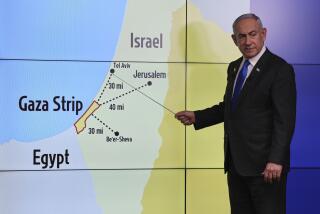Rabin Rejects U.S. Call for Change in Occupation Policy
- Share via
WASHINGTON — Israeli Defense Minister Yitzhak Rabin met with President Bush on Wednesday and bluntly rejected American calls for changes in Israel’s controversial occupation policies in the West Bank and the Gaza Strip.
“Israel will not budge an inch” until Palestinians agree to Israel’s formula for opening negotiations on the future of the occupied territories, Rabin said after the half-hour meeting with Bush. “In the Middle East there are no short cuts, no ‘open sesame’ solutions.”
Rabin specifically rejected a call by Secretary of State James A. Baker III that Israel allow schools on the West Bank to reopen. In a reference to the Palestinian uprising that began in December, 1987, he noted that the Israeli government three times has offered to allow schools to open if the Palestinians would pledge to “take the schools out of the violence.”
Reach Out to Neighbors
On Monday, Baker had called for the schools to reopen as part of a process designed to “reach out to Palestinians as neighbors who deserve political rights.” Israeli Prime Minister Yitzhak Shamir rejected Baker’s speech, calling it “useless.” Rabin seemed only slightly more conciliatory.
“It will be advisable to all parties,” he said, to avoid focusing on issues where “we know we are deeply divided.”
Earlier, Rabin disclosed that the United States had conducted almost 30 troop exercises in Israel in the last five years. The maneuvers recently have expanded in scope, he added, and last month, for the first time, a full U.S. Marine battalion conducted war practice on Israeli soil with live artillery and attack helicopters.
The fact that the United States has conducted military maneuvers in Israel has been an open secret for years, but Rabin’s remarks, made in a speech to the Jewish Institute for National Security Affairs, was the first official statement to provide details of their size and scope.
Maneuvers Increased
Until a month ago, Rabin said, the maneuvers had been kept to the size of a company, roughly 180 soldiers. But at the request of the commander of the U.S. 6th Fleet, Vice Adm. J. D. Williams, Israel had agreed to an exercise using a full battalion, roughly 900 troops.
The U.S. government, which generally has tried to keep the maneuvers out of sight, would not comment on Rabin’s statement.
Despite the rejection of Baker’s proposals, Administration officials put the best face on the meetings with Rabin, emphasizing areas of cooperation and calling Rabin’s session with Bush “productive.”
At the State Department, spokeswoman Margaret Tutwiler said that the United States is “wholeheartedly supportive” of Shamir’s proposal for supervised elections on the West Bank to chose Palestinian leaders with whom Israel could negotiate.
The statement was the strongest U.S. endorsement of Shamir’s election plan. Elections would be the first step in a multi-year process of “confidence building” that would end in limited self-government for the Palestinians, but not in a Palestinian state.
And White House Press Secretary Marlin Fitzwater said Bush “made clear his determination to provide Israel with the resources necessary for its security.”
“The military strength of Israel is a guarantee against the outbreak of hostilities,” Rabin said. “The stronger Israel will be, the more risks Israel can take for peace.”
More to Read
Sign up for Essential California
The most important California stories and recommendations in your inbox every morning.
You may occasionally receive promotional content from the Los Angeles Times.














